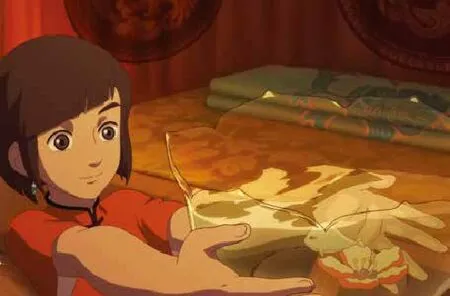视听空间 ZOETROPE
视听空间ZOETROPE
a human boy at the cost of his own life, Chun is determined to repay her debt, goes to the witch who guards all human souls, and trades the boy’s life for half of her own—an endeavor that soon brings disaster to her world. The film seems to be based on concepts of Buddhist karma, reincarnation, and the carefree Daoist spirit.
In comparison to its ambitious world-building, the film’s plot and setting feel cursory and flat.
Chun isn’t exactly easy to like. She is fragile, obstinate, and dismissive of the witch’s admonition that karma debts can never be cleared. However,“As long as you are kind in heart, right and wrong is someone else’s judgment”, says Chun’s grandfather, the lord of all herbs and a symbol of ultimate wisdom. Ambiguity and confusion is probably the last message an animated film should leave for children; for adults, they can use this pretext to bash the film for not living up to expectations.
The volume of archival research behind the film is evident. Almost every character has a fascinating origin grounded in ancient Chinese legends and mythical texts like the Classic of Mountains and Seas and In Search of the Supernaturals. It also borrows from the Daoist classic, Zhuangzi: “In the northern ocean there is a fish, called the Kun, many thousand li in size.” In return, Kun is the name of the big fish that plays a key role in the film. These materials, rich in cultural allusions and metaphorical imagination, give Big Fish & Begonia a brilliant form to flesh out, and it should have acted as more than an audience magnet or hollow attempt at intellectualizing.
Perhaps when the audience is expecting a savior of the Chinese animation film industry, a work that genuinely grows from “Chinese culture” and speaking in the authentic“Chinese language”, they should first collectively pin down the definition of abstractions like culture and language. Collages of mythical legends and classical texts that are not truly internalized in a body of work are in essence the same acts of appropriation as the Disneyfied China. It’s hard to put decades of anticipation and thousands of years of history into an animated film—or any film for that matter. - LI YANTING (李妍婷)

In the film, Chun trades half of her life for the soul of a human boy
Qiu: I want to forget something, but I can’t, no matter how hard I try.
Wǒ xiǎng wàngdiào yìxiē shìqing, zěnme yě wàng bu liǎo.
我想忘掉一些事情,怎么也忘不了。
Lushen: Then don’t. It takes no effort to truly forget.
Wàng bu liǎo jiù bié wàng le, zhēnzhèng de wàngjì shì bù xūyào nǔlì de.
忘不了就别忘了,真正的忘记是不用努力的。
Q: I am in pain. Wǒ juéde hěn tòngkǔ.
我觉得很痛苦。
L: Sometimes pain is good. Tòngkǔ yǒu shíhou shì hǎo dōngxi a.
痛苦有时候是好东西啊。
Q: Do you have something that can make me forget the pain? Yǒuméiyǒu néng wàngdiào tòngkǔ de yào?
有没有能忘掉痛苦的药?
L: I only have one kind of medicine that can make you forget about everything painful and beautiful. Humans call it“Mengpo Soup”.
Wǒ zhǐyǒu yì zhǒng yào, néng ràng nǐ wàngdiào suǒyǒu de tòngkǔ hé měihǎo, shìrén jiào tā Mèngpó Tāng.
我只有一种药,能让你忘掉所有的痛苦和美好, 世人叫它孟婆汤。
Q: Just give me a bottle of wine. Háishi gěi wǒ lái hú jiǔ ba.
还是给我来壶酒吧。

